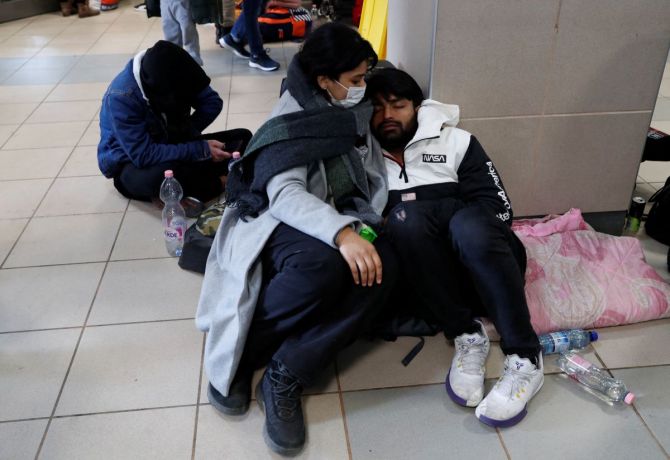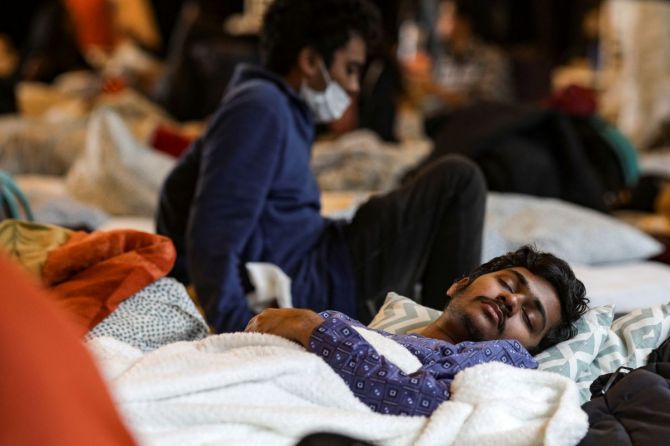'An ambassador may not be sure whether there would be a war next month, but prudence requires him to take action to see to it that people leave early.'
'Because once the war starts, it will be very difficult to move out.'

The government calls it Operation Ganga -- evacuating Indian students stranded in the war zone in Ukraine.
The prime minister claimed at an election rally in UP that the evacuation was possible only because of 'India's rising power'.
But many in India may not remember that 32 years ago, in 1990, the Indian government conducted one of the largest evacuations ever -- of over 170,000 citizens from Kuwait.
Ambassador K P Fabian was then the joint secretary of the Gulf division at the ministry of external affairs.
In contrast, the Narendra Damodardas Modi government has scrambled to evacuate thousands of Indian students from Ukraine, which is currently under attack from Russia, even sending four central ministers to supervise the exercise.
"I would say it was an error of judgment; India did not anticipate a full-fledged war. In such matters, what is required is prudence," Ambassador Fabian tells Rediff.com's Shobha Warrier about the delay in undertaking Operation Ganga.
The first of a two-part interview:
How did India conduct such a large evacuation process so efficiently in 1990?
We could manage it because there was synergy between the central government, the state governments, and civil society.
I will give you an example. Indians were in their thousands in Jordan, and when I went to one place, I was told that they were not getting bottled water to drink.
I made a phone call to the Indian Women's Association in Abu Dhabi, the head of which was the wife of the Indian ambassador there.
In less than one hour, a truck load of bottled water came.
This is what I call civil society co-operation. If I had asked Delhi, there will be the bureaucratic issue of first getting a financial sanction to place an order for water.
You know how time consuming it can be when people needed water to drink.
What I want to say is that India as a whole acted with more synergy then.
We also had the freedom to take decisions as we were on the ground.
We also had decided in the beginning itself that we would not charge any money from our nationals.
But this government took that decision only much later, after many students had been fleeced by the airlines.
What I want to say is, decision-making was smoother and faster though we did not have the advantage of e-mails or mobile phones or the Internet.

You mean, centralisation of decision-making should not be there in times like these?
In fact, it should never be there! Yes, certainly not during times like these.
What we require is lateral thinking in problem solving.
I remember one morning, when I was in Amman, the Air India manager came with a long face to breakfast because the Air India crew refused to fly because the passengers reached there very late the previous evening.
They walked out because by the time the flight reached Delhi, they would have been on duty for many hours!
So, the Air India manager had to take care of all the passengers including old people, women with babies, etc.
He wanted me to talk to the civil aviation secretary, foreign secretary, etc, I agreed to think it over.
I concluded that nobody in Delhi would be able to solve the problem.
Instead, I decided to make use of the media. I requested a journalist to write about the exemplary work the Air India crew had been doing.
When the news praising their dedication came out, they had no other choice but stop being rigid about extra working hours!

In 1990, more than 170,000 people were evacuated. How challenging was the entire process?
The challenging part was we could send the flights only to Amman as there was an embargo to fly to Kuwait or Iraq because of UN sanctions.
So, Indians from Kuwait and Iraq had to reach Jordan by road to catch the flight.
Our embassies in Kuwait and Iraq worked with the local community, and it was the community that organised buses to Jordan.
There was perfect co-ordination between the community and the embassies.
In today's scenario, I do not know whether it is there. I am told that the embassy had not mobilised the local community.
Though there is no big Indian community there, there are industrialists in Ukraine.
For example, war is happening in Kharkiv, but there is no consulate there.
So, you have to depend on the Indian community or an Indian company there.
India also had a proper plan for evacuation after Kuwait was invaded.
We tried to see whether it could be resolved through negotiations.
(Then external affairs minister) I K Gujral went to Washington, but came back knowing that the Americans wanted the war.
So, we knew if there was going to be a war, we had to evacuate our people before America started the war to expel Iraq from Kuwait.
And we started the evacuation then itself; we did not wait for the United States coalition to attack Iraq.
What is known as Operation Desert Storm of bombing Iraq started in February 1991 and we started the evacuation process in August 1990 completed much before Desert Storm.

Countries like the US asked its citizens to vacate Ukraine much earlier. Do you think India should have asked the students to come back earlier?
I would say it was an error of judgment; India did not anticipate a full-fledged war.
In such matters, what is required is prudence. If war clouds are gathering, there will be war though you cannot say when.
An ambassador or a joint secretary might not be sure whether there would be a war next month, but prudence requires him or her to take action to see to it that people leave early.
Because once the war starts, it will be very difficult to move out.
What they should have done was, they should have asked the students there to get out of Ukraine weeks ago.
They (the students) need not have come to India. Some students might have chosen to wait around in neighbouring countries.
It was also not important to bring them all back to India. What is important was to get them out of Ukraine. They could go to Poland, they could go to Germany...
If you are a student, once you reach Warsaw, you may find that you have a friend there, or another good friend or a cousin in another European country.
The GOI should have shown this sort of prudence.
Another thing is, if you check the language of the first advisory, it was quite vague.
An advisory should not say, 'You should consider the pros and cons'... 'Don't stay unless it is absolutely necessary', etc.
An advisory should be very clear; like, 'You should leave immediately.' The language is very important to convey the message.
Feature Presentation: Aslam Hunani/Rediff.com










